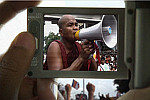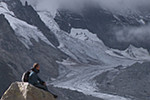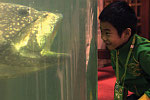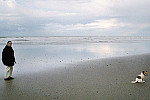 Shadows off the beaten path
Shadows off the beaten pathTHE END OF THE LINE | SLEEP FURIOUSLY
< < D O C S > >
last update 9.Jun.09
See also: SHADOWS FILM FESTIVAL
 R E V I E W B Y R I C H C L I N E
R E V I E W B Y R I C H C L I N E MUST
MUST  SEE
SEE
scr Anders Ostergaard, Jan Krogsgaard
with Joshua, Ko Mauno
 release US 20.May.09,
release US 20.May.09, UK 17.Jul.09
08/Denmark 1h24
SUNDANCE FILM FEST
 A gripping film about journalism in a seriously extreme situation, this doc tells the fascinating story behind the guerrilla images shown on our news about the situation in Burma, one of the most repressive governments on earth.
A gripping film about journalism in a seriously extreme situation, this doc tells the fascinating story behind the guerrilla images shown on our news about the situation in Burma, one of the most repressive governments on earth.
The film is narrated by the 27-year-old activist Joshua, whose job as a VJ (video journalist) is to record events then smuggle the footage to the world's press by internet or satellite phone. As part of the Democratic Voice of Burma, a TV channel in exile, he is involved in covering the monks' protest in September 2007 and the government's subsequent violent crackdown. And once the monks are silenced, the government goons go after the video crew.
Some segments of this film play out more like a Blair Witch-style thriller than a doc, as the camera captures grim violence and breathy escapes (a title tells us that some footage has been recreated). But what's even more provocative and moving is the way these journalists are risking their lives to cover the story. The monks' protest in 2007 was the first uprising against the tyrannical military junta since 1988, when 3,000 protesters were murdered and the democratically elected leader, Aung San Suu Kyi, was placed under house arrest, where she remains today.
Watching these scenes, which the leaders want to hide from the world, is pretty horrific. And the bravery of these young journalists is seriously inspirational, as are the monks who put their lives on the line in the name of their nation's oppressed poor. This is a country of 55 million people that the West has essentially shrugged off. And these young, tenacious journalists have one goal: to make sure the world doesn't forget about them.
As they go about their business, we really feel their fear and tenacity, as well as their hope that someday the injustice, violence and intimidation must end. It's a captivating story, filled with moments of raw horror as well as exhilarating triumph (such as when Joshua sees his footage on the BBC). And the developing story of the 2007 protests has much more texture and detail when told from this perspective, as opposed to the limited reporting we got at the time. This film can't help but inspire anyone who sees it to take action in some way.
26.May.09
 R E V I E W B Y R I C H C L I N E
R E V I E W B Y R I C H C L I N E Heimatklänge
Heimatklänge
with Erika Stucky, Christian Zehnder, Noldi Alder Sina, Stimmhorn, Huun Huur Tu
 release UK 10.Jul.09
release UK 10.Jul.0907/Switzerland 1h22
BERLIN FILM FEST
 As an anthropological document, this film has huge value for examining a form of music that's usually ridiculed. That would be yodelling. Sadly, the film isn't sharp enough to win over many new fans.
As an anthropological document, this film has huge value for examining a form of music that's usually ridiculed. That would be yodelling. Sadly, the film isn't sharp enough to win over many new fans.
There's a very strong sense of connection between yodellers and the Alps. "If I lived in a desert, I'd sing differently," says Zehnder, a 47-year-old who blends old-style yodelling with more experimental vocalisations, including a growling overtone that originates in Central Asia. And we travel there with him to practice. Meanwhile, we also meet the lively Stucky, who is part singer, stand-up and performance artist and blends her Swiss and American heritage into a bold, colourful personality. And Alder is a former child singer who mainly sticks to the traditional ways.
Al three of these musicians perform for the cameras and on stage, sing along with others, and teach eager students (in very different styles). They also take us through key elements from their lives: how music helped Zehnder recover from illness, Stucky's dreams of being a hula dancer, Alder's past with his singing family. All of this reinforces the idea that yodelling is much more than an indigenous musical form: it's their identity, a kind of healing, a form of communing with nature.
What emerges is an intriguing look at this music from a fresh perspective. Although with the exception of Stucky, everyone seems to take it far too seriously. The singers' faces are often pained or filled with exaggerated emotion, and it also doesn't help that they're sometimes wearing lederhosen, complete with giant bells and diorama headdresses. Not to mention the guys blowing into massive Alphorns in the background. Fortunately, Stucky cuts through this silliness with a grounded sense of humour and a bonkers personality.
On the other hand, filmmaker Schwietert sometimes seems to struggle with this balance. The languorous shots of the mountains accompanied by ethereal singing are beautiful, and the variety of footage is terrific, including old travelogue footage, clips from classic films and some home movies. And the new-style singing is definitely impressive, in an artful sort of way. But structurally, the film is a bit repetitive and stretched out; even at just 82 minutes it feels long. And in the end, the best sequence is the one showing an old farmer talking to his cows through song.
5.Jun.09
 R E V I E W B Y R I C H C L I N E
R E V I E W B Y R I C H C L I N E
with Charles Clover, Roberto Mielgo Bragazzi, Brian Mulroney, John Crosbie, Daniel Pauly, Jeffrey Hutchings, Manolo Pacheco Luis, Adama Mbergaul, Boris Worm, Hardy Mckinney, Patricia Majluf, Ray Hilborn
 release UK 12.Jun.09
release UK 12.Jun.0909/UK 1h30
SUNDANCE FILM FEST
 Yet another urgent subject gets the documentary treatment: the calamitous effects of overfishing on the world's oceans. And while it's an extremely well-made film, all of this doom and gloom is getting overwhelming.
Yet another urgent subject gets the documentary treatment: the calamitous effects of overfishing on the world's oceans. And while it's an extremely well-made film, all of this doom and gloom is getting overwhelming.
The fact is that there are fewer fish in the sea. Old patterns of reproduction and migration are disappearing, fishing regions are drying up, and what was once thought to be an inexhaustible resource is, well, exhausted. Talking to scientists, experts and life-long fisherman, the filmmaker discovers that the main problem is industrial-scale fishing, most notoriously the practice of trawling the seabed, which is the equivalent of ploughing a field seven times in one year. So it's unsurprising that life is being wiped out.
Director Murray keeps things visually fascinating, with densely coloured cinematography and a lush attention to detail both above and below the water's surface. While this makes the film extremely watchable, it doesn't mask the depressing facts that there's not much we can do about it now. Essentially, humans are too good at hunting. As one expert observes, "Technologically, not a single hunted animal on the planet has a chance." So we've turned the sea into a resource that's not capable of renewing itself.
The film documents how this has happened, and it's clear that the main problem lies in government reports that are completely fraudulent (finger-pointing at China) or fishing limits that don't come close to what's needed to sustain the fish. This loss of balance has created a domino effect that is virtually impossible to reverse. Some scientists say that we could actually wipe out the fish completely within the next 50 years at this rate.
These genuinely horrific (and perhaps exaggerated) figures highlight a hugely important issue that this watchable film explores with clarity and balance. But after documentaries on environmental chaos, corporate greed, state-sponsored torture, oil shortages and mass food production, this is almost more than we can bear to watch. And worst of all, the few suggested solutions seem rather simplistic (urge your government to create marine reserves, buy fish that's labelled sustainable), mainly because anyone who watches this film will already be doing those things.
28.Apr.09
 R E V I E W B Y R I C H C L I N E
R E V I E W B Y R I C H C L I N E

release UK 29.May.09
08/UK 1h34

 A lyrical ode to a fading way of life, this film won't have much resonance beyond the Welsh valley where it was filmed. And even though it's sometimes picturesque and involving, it's also so achingly slow and indulgent that it will test even the most patient viewers.
A lyrical ode to a fading way of life, this film won't have much resonance beyond the Welsh valley where it was filmed. And even though it's sometimes picturesque and involving, it's also so achingly slow and indulgent that it will test even the most patient viewers.
The film is composed of slice-of-life scenes shot in a small farming community in the middle of Wales. Over four seasons, we see farmers baling hay and shearing sheep, children in their classrooms, a local fair, cows being milked, piglets being born and a guy with his mobile library van. We also catch snippets of conversation that tell us that the village is fading away; having already lost its bus service and post office, the powers that be now want to close the school.
Director-cinematographer Koppel seems very closely connected to his subject matter, although how is never made clear in the film (apparently his parents now live in this village). He assembles the material intriguingly, with a textured, overlapping sound mix and almost accidental camera work that's subtle and often very still. The images are strangely beautiful but also rather murky. They're edited to evoke quiet wit or strong nostalgia and sometimes accompanied by haunting music from Aphex Twin. There's also the odd full screen of colour as a kind of punctuation.
What all this means is beyond the comprehension of most audiences. The title turns out to be a quote from Noam Chomsky ("Colorless green ideas sleep furiously"), and there is a questioning sense that the film is probing the ways urbanisation dilutes local culture, undercutting the rural dwellers' feeling of belonging to society. But by the end you feel like you might have imagined that.
It's certainly a surreal experience to watch this film. The main problem is that there are a lot of people on screen, but we never get to know any of them at all, so the collection of people and places feels utterly random. All we are left with is Koppel's intriguing visual sensibility, a relaxed sense of a community holding on to each other as their lifestyle slips away, and some rather disturbingly beautiful time-lapse sequences. But it's far too pretentious to mean very much to anyone beyond the filmmaker himself.
20.Apr.0


See also: SHADOWS FILM FESTIVAL
© 2009 by Rich Cline, Shadows
on the Wall